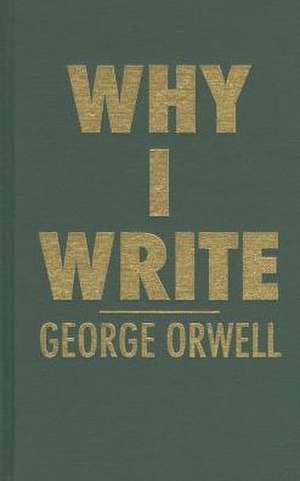Why I Write
Autor George Orwellen Limba Engleză Hardback – 31 ian 1994
Now, Penguin brings you the works of the great thinkers, pioneers, radicals and visionaries whose ideas shook civilization, and helped make us who we are. Penguin's Great Ideas series features twelve groundbreaking works by some of history's most prodigious thinkers, and each volume is beautifully packaged with a unique type-drive design that highlights the bookmaker's art. Offering great literature in great packages at great prices, this series is ideal for those readers who want to explore and savor the Great Ideas that have shaped the world.
Whether puncturing the lies of politicians, wittily dissecting the English character or telling unpalatable truths about war, Orwell's timeless, uncompromising essays are more relevant, entertaining and essential than ever in today's era of spin.
| Toate formatele și edițiile | Preț | Express |
|---|---|---|
| Paperback (3) | 33.82 lei 22-36 zile | +3.75 lei 6-12 zile |
| Renard Press Ltd – 2021 | 33.82 lei 22-36 zile | +3.75 lei 6-12 zile |
| Penguin Books – sep 2004 | 40.75 lei 25-31 zile | +12.31 lei 6-12 zile |
| Penguin Books – 31 aug 2005 | 75.30 lei 22-36 zile |
Preț: 214.81 lei
Nou
41.12€ • 44.68$ • 34.56£
Carte indisponibilă temporar
Specificații
ISBN-10: 0848833392
Dimensiuni: 147 x 223 x 18 mm
Greutate: 0.38 kg
Editura: Amereon Limited
Descriere
In Why I Write, Orwell describes his journey to becoming a writer, and his movement from writing poems to short stories to the works we remember him for. Why I Write is a unique opportunity to look into Orwell's mind, and it grants the reader an entirely different vantage point from which to consider the rest of the great writers' oeuvre.
Notă biografică
In 1936, he was commissioned by Victor Gollancz to visit areas of mass unemployment in Lancashire and Yorkshire, and The Road to Wigan Pier (1937) is a powerful description of the poverty he saw there. At the end of 1936 Orwell went to Spain to fight for the Republicans and was wounded, and Homage to Catalonia is his account of the civil war. He was admitted to a sanatorium in 1938 and from then on was never fully fit. He spent six months in Morocco and there wrote Coming Up for Air. During the Second World War he served in the Home Guard and worked for the BBC Eastern Service from 1941 to 1943. As literary editor of the Tribune he contributed a regular page of political and literary commentary, and he also wrote for the Observer and later for the Manchester Evening News. His unique political allegory, Animal Farm, was published in 1945, and it was this novel, together with Nineteen Eighty-Four (1949), which brought him world-wide fame.
George Orwell died in London in January 1950. A few days before, Desmond MacCarthy had sent him a message of greeting in which he wrote: 'You have made an indelible mark on English literature . . . you are among the few memorable writers of your generation.'
Cuprins
The Lion and the Unicorn
A Hanging
Politics and the English Language
Extras
I was the middle child of three, but there was a gap of five years on either side, and I barely saw my father before I was eight. For this and other reasons I was somewhat lonely, and I soon developed disagreeable mannerisms which made me unpopular throughout my schooldays. I had the lonely child's habit of making up stories and holding conversations with imaginary persons, and I think from the very start my literary ambitions were mixed up with the feeling of being isolated and undervalued. I knew that I had a facility with words and a power of facing unpleasant facts, and I felt that this created a sort of private world in which I could get my own back for my failure in everyday life. Nevertheless the volume of serious - i.e. seriously intended - writing which I produced all through my childhood and boyhood would not amount to half a dozen pages. I wrote my first poem at the age of four or five, my mother taking it down to dictation.
























